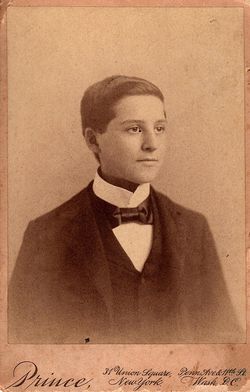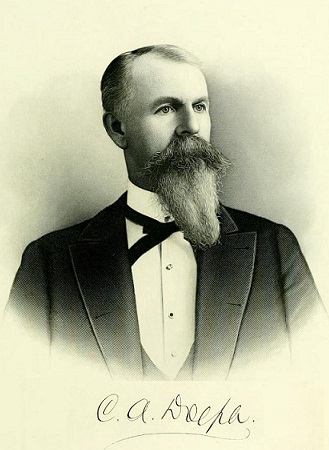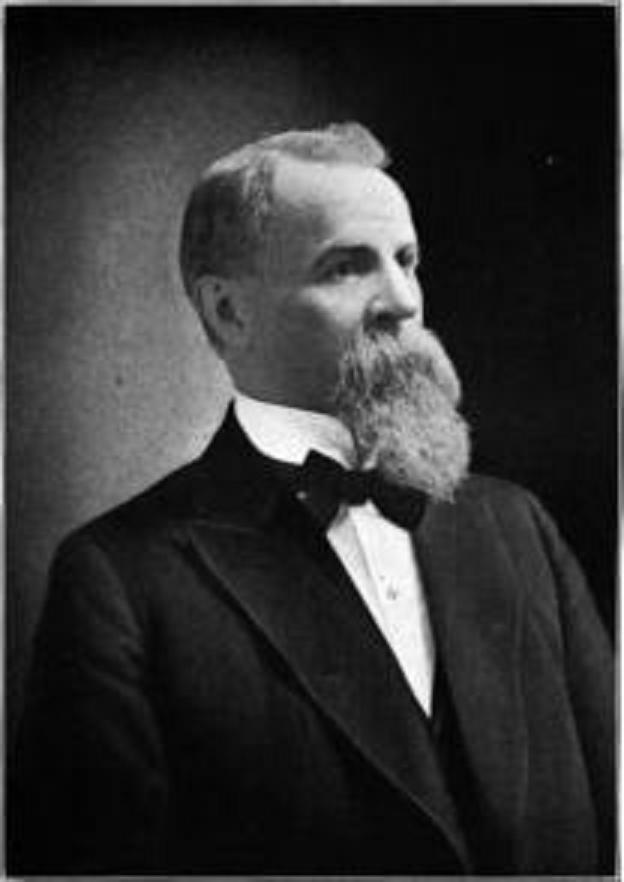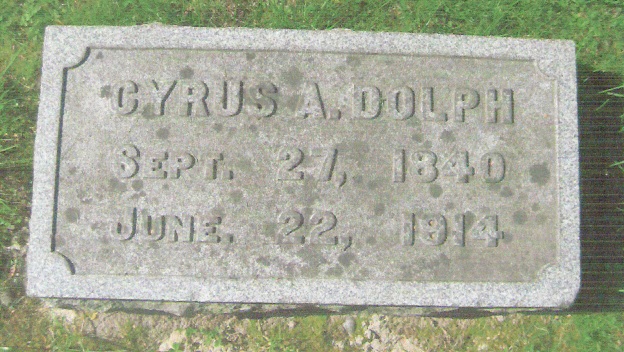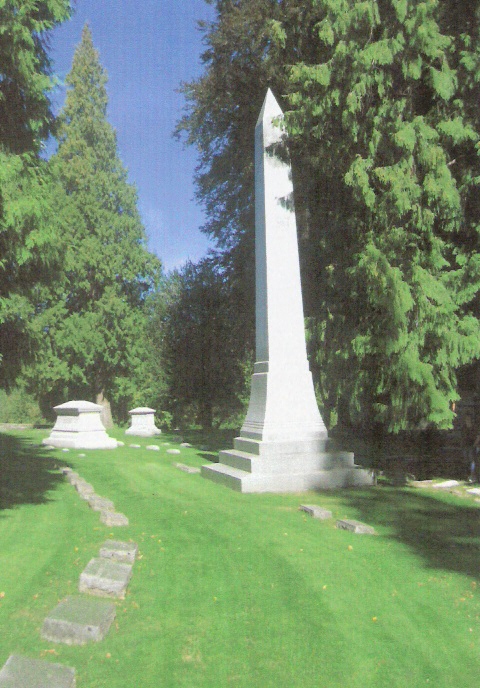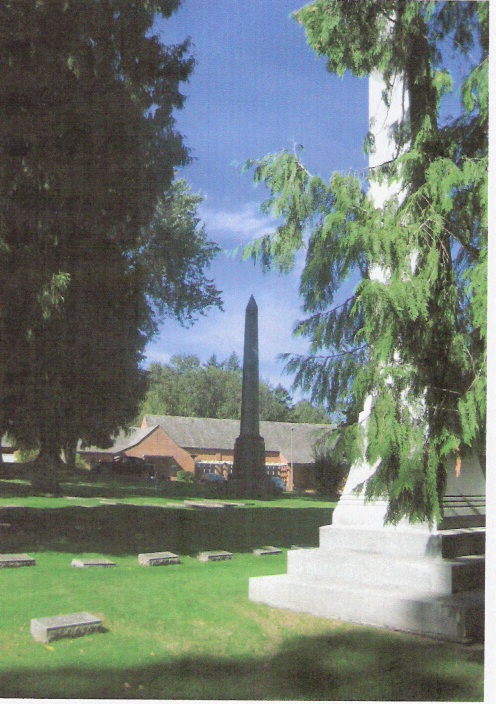June 23, 1914 pg. 13
CYRUS A. DOLPH, 73, ATTORNEY, IS DEAD
Prominent Pioneer Leaves His Imprint on Many of City's Largest Achievements
SONS HURRYING FROM EAST
Noted Lawyer's Activities Closely Identified With Formative Days of Railroads, Schools, Banks and Bar of Northwest
Cyrus Abda Dolph, a prominent pioneer attorney, the first president of the Oregon State Bar Association, and an active factor in the development of the city and state, died at St. Vincent's Hospital yesterday morning after a brief illness, aged 73 years.
Mr. Dolph was one of the men contributed by the State of New York to the great West to aid in building up and shaping the destinies of the larger half of the continent.
He had been a resident of Oregon for 53 years and had been prominently identified with the growth of Portland during all the marvelous changes which have occurred in its development from a frontier village to a city of its present size.
For Half Century Was Leader
For half a century Mr. Dolph was one of the acknowledged leaders of the bar and his influence on both the moral and commercial development of the state was great.
He was born in Schuyler County, New York, September 27, 1840, and was the son of Chester V. Dolph and Elizabeth Vanderbilt Steel. On his paternal side he was the grandson of Abda de Wolfe, the name having been changed to Dolph in 1833, and on his maternal side he was the grandson of Jacob Vanderbilt, of Staten Island, N. Y.
The history of the Dolph family records the fact that Balthazar de Wolfe, first of the family to reside on American soil, settle in Weathersfield, Conn., in 1620. In the annals of the French and Indian wars, and more particularly the Revolutionary War, are to be found the names of many of Balthazar de Wolfe's descendants, who served with distinction. Mr. Dolph was called Abda, in honor of his great-grandfather, who was born in 1740 in Boston, Mass., and who won military honors in the war of 1776.
After receiving a common school education, in 1858, Mr. Dolph changed from scholar to teacher and for the next succeeding three years taught in one of the New York State schools, until he gave up his position to enlist in an independent company formed by an act of Congress for protecting immigration to the Pacific Coast.
Portland Reached in 1862
With his brother, the late United States Senator Joseph N. Dolph, he left New York, Mary 17, 1862, arriving in Portland in November of the same year.
During his period of teaching Mr. Dolph had taken up the study of law, more as a recreation than as a profession, but at that time decided to follow its course, and accordingly resumed his studies. He was admitted to the bar in 1866 and immediately started upon the active practice of his profession. He was a hard and conscientious worker, and was known for the exceptional soundness of his judgment. Having a retentive and discriminating mind, he never forgot nor misapplied a case. Almost immediately after being admitted he came to the front as a representative of the legal profession here, a position which he maintained until his death, being numbered among those who have conferred honor and dignity upon the legal profession and have brought to the Oregon bar a reputation which places it on a par with the bar in the older states of the East. Mr. Dolph was regarded as one of the foremost law counselors on the Coast and specialized to a large extent in corporation and railroad law.
City Attorneyship Unsolicited
In June, 1869, Mr. Dolph was elected City Attorney of Portland, nomination on the Republican ticket and election by a large majority having come without solicitation.
In 1874, during his temporary absence from the city, he was nominated by the Republicans for the State Legislature, but declined the honor, as he did two year later, when the nomination for State Senator was tendered him. From 1883 to 1889 he was a member of the directorate of the Oregon Railroad & Navigation Company. In 1883 Henry Villard, then president of the Oregon Railroad & Navigation Company and the Northern Pacific Railroad Company, selected Mr. Dolph as general attorney for the first named corporation and consulting attorney in Oregon for the latter. These positions he filled with ability and in a manner indicative of his high legal talent. Speaking of Mr. Dolph in this connection one of his co-directors said: "The many important and intricate questions that arose he handled with dispatch and decision, disposing of them to the entire satisfaction of the officers and stockholders of the companies."
For years Mr. Dolph served as director of the Oregon & California Railroad and was retained as general attorney of the corporation. For 31 years he was director of the Northern Pacific Terminal Company of Oregon, and was its president for 12 years.
Mr. Dolph was associated as partner with a number of the brightest minds connected with the bar of this state.
Firm established in 1873
February 1, 1873, he, in connection with his brother, the late Senator Joseph N. Dolph; Judge E. C. Bronaugh and Joseph Simon, formed the law firm of Dolph, Bronaugh, Dolph & Simon. This firm continued until 1883, when Joseph N. Dolph had been elected to the United States Senate and Judge Bronaugh retired to reside in California. At this time a new firm was formed, of which C. A. Dolph became senior member. Associated with him were Judge C. B. Bellinger, Rufus Mallory and Joseph Simon. C. B. Bellinger subsequently became Federal Judge and John M. Gearin some years later was admitted to the firm. Last year Mr. Dolph celebrated the fortieth anniversary of the founding of the law firm of which he was the senior member at the time of his death.
On this occasion, speaking of these 40 years of continuous law association and the business of the firm, Mr. Dolph said; "I look at our list of clients with especial gratification. When the old firm that preceded us began business it gathered as its clients some of the best men of those days. These men have practically all passed away, but their children still retain us as their advisers, and, in numerous cases, the third generation has no other attorneys.
In 1891, he was urged by President Harrison to accept the appointment of Circuit Judge of the Ninth Judicial Circuit and was generally indorsed by the best citizens of the Northwest. However, feeling that the acceptance of this honor would interfere with his life work, he declined the position.
In 1898, Mr. Dolph was made president of the board of trustees of the Portland Library Association, which position he held for about 10 years.
He was instrumental in the formation and organization of the Security Savings & Trust Company and has been a director since its organization. He assisted in organizing various other banking institutions and was attorney for a number of banks. He was also one of the organizers and directors of the Portland hotel Company and served as its president for a number of years.
Mr. Dolph took an active interest in the educational affairs of his state up to the time of his death. He was for many years a regent of the University of Oregon and attended the last meeting of that body, held at Eugene on Tuesday of last week. He remarked to a friend at that time that he had not missed a meeting of the Board of Regents in 16 years.
Reed College His Handiwork
He was vice-president of the Board of Trustees of Reed College, and in the creation of this college played a most important part as personal attorney of Mrs. Reed. He drafted her will, which gave the bulk of the Reed estate as the foundation of the college, the details of which he and Mrs. Reed worked out together.
During his life he was active in two fraternal organizations, the Oddfellows and the Masons. He was a 33d degree honorary Scottish Rite mason and a Knight Templar, and greatly devoted to the order.
Mr. Dolph was interested in many philanthropic enterprises, and, among his other offices, was president of the board of trustees of the Old People's Home, to which he devoted a great deal of time, and rendered much substantial service.
He was president of the board of trustees of the First Baptist Church for about 25 years and one of the prominent men in its affairs.
One of his close associates, speaking of the dead attorney,
said; "To recite the story of his life would be the record of the historian who should write the history of this city, with which his name was so intimately connected. He was wedded to his profession and was gifted with rare legal attainments, coupled with sound judgment and a sense of right and justice. He was always interested in municipal affairs and never refused aid and counsel in affairs of his city which tended to the improvement and development of his adopted home."
Judge Bellinger said of him: "he has, in an unusual degree, those qualities which distinguish the safe lawyer from the showy one; steadfast in his friendship, conservative in his judgment, when the conduct of others exposes them to censure; considerate of the feelings of his fellows; scrupulously careful of the rights of those with whom he was brought into business relations, and conscientious in all he does, he is deservedly held in high esteem by all who know him."
Mr. Dolph is survived by his widow, a daughter, Miss Hazel, and three sons, William V., Joseph N., and John. The tow latter sons have been traveling in the East. The family home is at 363 West Park street. The funeral will be held upon their return, probably Thursday.
Both the Federal and the Circuit Courts were formally advised yesterday morning of Mr. Dolph's death. A common committee was appointed from the two courts to draw up resolutions and to arrange for attendance at the funeral by the bar. The committee is as follows: Joseph Simon, W. D. Fenton, H. H. Northup, Wallace McCamant and Earl C. Bronaugh.
June 23, 1914 pg. 13
CYRUS A. DOLPH, 73, ATTORNEY, IS DEAD
Prominent Pioneer Leaves His Imprint on Many of City's Largest Achievements
SONS HURRYING FROM EAST
Noted Lawyer's Activities Closely Identified With Formative Days of Railroads, Schools, Banks and Bar of Northwest
Cyrus Abda Dolph, a prominent pioneer attorney, the first president of the Oregon State Bar Association, and an active factor in the development of the city and state, died at St. Vincent's Hospital yesterday morning after a brief illness, aged 73 years.
Mr. Dolph was one of the men contributed by the State of New York to the great West to aid in building up and shaping the destinies of the larger half of the continent.
He had been a resident of Oregon for 53 years and had been prominently identified with the growth of Portland during all the marvelous changes which have occurred in its development from a frontier village to a city of its present size.
For Half Century Was Leader
For half a century Mr. Dolph was one of the acknowledged leaders of the bar and his influence on both the moral and commercial development of the state was great.
He was born in Schuyler County, New York, September 27, 1840, and was the son of Chester V. Dolph and Elizabeth Vanderbilt Steel. On his paternal side he was the grandson of Abda de Wolfe, the name having been changed to Dolph in 1833, and on his maternal side he was the grandson of Jacob Vanderbilt, of Staten Island, N. Y.
The history of the Dolph family records the fact that Balthazar de Wolfe, first of the family to reside on American soil, settle in Weathersfield, Conn., in 1620. In the annals of the French and Indian wars, and more particularly the Revolutionary War, are to be found the names of many of Balthazar de Wolfe's descendants, who served with distinction. Mr. Dolph was called Abda, in honor of his great-grandfather, who was born in 1740 in Boston, Mass., and who won military honors in the war of 1776.
After receiving a common school education, in 1858, Mr. Dolph changed from scholar to teacher and for the next succeeding three years taught in one of the New York State schools, until he gave up his position to enlist in an independent company formed by an act of Congress for protecting immigration to the Pacific Coast.
Portland Reached in 1862
With his brother, the late United States Senator Joseph N. Dolph, he left New York, Mary 17, 1862, arriving in Portland in November of the same year.
During his period of teaching Mr. Dolph had taken up the study of law, more as a recreation than as a profession, but at that time decided to follow its course, and accordingly resumed his studies. He was admitted to the bar in 1866 and immediately started upon the active practice of his profession. He was a hard and conscientious worker, and was known for the exceptional soundness of his judgment. Having a retentive and discriminating mind, he never forgot nor misapplied a case. Almost immediately after being admitted he came to the front as a representative of the legal profession here, a position which he maintained until his death, being numbered among those who have conferred honor and dignity upon the legal profession and have brought to the Oregon bar a reputation which places it on a par with the bar in the older states of the East. Mr. Dolph was regarded as one of the foremost law counselors on the Coast and specialized to a large extent in corporation and railroad law.
City Attorneyship Unsolicited
In June, 1869, Mr. Dolph was elected City Attorney of Portland, nomination on the Republican ticket and election by a large majority having come without solicitation.
In 1874, during his temporary absence from the city, he was nominated by the Republicans for the State Legislature, but declined the honor, as he did two year later, when the nomination for State Senator was tendered him. From 1883 to 1889 he was a member of the directorate of the Oregon Railroad & Navigation Company. In 1883 Henry Villard, then president of the Oregon Railroad & Navigation Company and the Northern Pacific Railroad Company, selected Mr. Dolph as general attorney for the first named corporation and consulting attorney in Oregon for the latter. These positions he filled with ability and in a manner indicative of his high legal talent. Speaking of Mr. Dolph in this connection one of his co-directors said: "The many important and intricate questions that arose he handled with dispatch and decision, disposing of them to the entire satisfaction of the officers and stockholders of the companies."
For years Mr. Dolph served as director of the Oregon & California Railroad and was retained as general attorney of the corporation. For 31 years he was director of the Northern Pacific Terminal Company of Oregon, and was its president for 12 years.
Mr. Dolph was associated as partner with a number of the brightest minds connected with the bar of this state.
Firm established in 1873
February 1, 1873, he, in connection with his brother, the late Senator Joseph N. Dolph; Judge E. C. Bronaugh and Joseph Simon, formed the law firm of Dolph, Bronaugh, Dolph & Simon. This firm continued until 1883, when Joseph N. Dolph had been elected to the United States Senate and Judge Bronaugh retired to reside in California. At this time a new firm was formed, of which C. A. Dolph became senior member. Associated with him were Judge C. B. Bellinger, Rufus Mallory and Joseph Simon. C. B. Bellinger subsequently became Federal Judge and John M. Gearin some years later was admitted to the firm. Last year Mr. Dolph celebrated the fortieth anniversary of the founding of the law firm of which he was the senior member at the time of his death.
On this occasion, speaking of these 40 years of continuous law association and the business of the firm, Mr. Dolph said; "I look at our list of clients with especial gratification. When the old firm that preceded us began business it gathered as its clients some of the best men of those days. These men have practically all passed away, but their children still retain us as their advisers, and, in numerous cases, the third generation has no other attorneys.
In 1891, he was urged by President Harrison to accept the appointment of Circuit Judge of the Ninth Judicial Circuit and was generally indorsed by the best citizens of the Northwest. However, feeling that the acceptance of this honor would interfere with his life work, he declined the position.
In 1898, Mr. Dolph was made president of the board of trustees of the Portland Library Association, which position he held for about 10 years.
He was instrumental in the formation and organization of the Security Savings & Trust Company and has been a director since its organization. He assisted in organizing various other banking institutions and was attorney for a number of banks. He was also one of the organizers and directors of the Portland hotel Company and served as its president for a number of years.
Mr. Dolph took an active interest in the educational affairs of his state up to the time of his death. He was for many years a regent of the University of Oregon and attended the last meeting of that body, held at Eugene on Tuesday of last week. He remarked to a friend at that time that he had not missed a meeting of the Board of Regents in 16 years.
Reed College His Handiwork
He was vice-president of the Board of Trustees of Reed College, and in the creation of this college played a most important part as personal attorney of Mrs. Reed. He drafted her will, which gave the bulk of the Reed estate as the foundation of the college, the details of which he and Mrs. Reed worked out together.
During his life he was active in two fraternal organizations, the Oddfellows and the Masons. He was a 33d degree honorary Scottish Rite mason and a Knight Templar, and greatly devoted to the order.
Mr. Dolph was interested in many philanthropic enterprises, and, among his other offices, was president of the board of trustees of the Old People's Home, to which he devoted a great deal of time, and rendered much substantial service.
He was president of the board of trustees of the First Baptist Church for about 25 years and one of the prominent men in its affairs.
One of his close associates, speaking of the dead attorney,
said; "To recite the story of his life would be the record of the historian who should write the history of this city, with which his name was so intimately connected. He was wedded to his profession and was gifted with rare legal attainments, coupled with sound judgment and a sense of right and justice. He was always interested in municipal affairs and never refused aid and counsel in affairs of his city which tended to the improvement and development of his adopted home."
Judge Bellinger said of him: "he has, in an unusual degree, those qualities which distinguish the safe lawyer from the showy one; steadfast in his friendship, conservative in his judgment, when the conduct of others exposes them to censure; considerate of the feelings of his fellows; scrupulously careful of the rights of those with whom he was brought into business relations, and conscientious in all he does, he is deservedly held in high esteem by all who know him."
Mr. Dolph is survived by his widow, a daughter, Miss Hazel, and three sons, William V., Joseph N., and John. The tow latter sons have been traveling in the East. The family home is at 363 West Park street. The funeral will be held upon their return, probably Thursday.
Both the Federal and the Circuit Courts were formally advised yesterday morning of Mr. Dolph's death. A common committee was appointed from the two courts to draw up resolutions and to arrange for attendance at the funeral by the bar. The committee is as follows: Joseph Simon, W. D. Fenton, H. H. Northup, Wallace McCamant and Earl C. Bronaugh.
Family Members
Sponsored by Ancestry
Advertisement
Explore more
Sponsored by Ancestry
Advertisement
